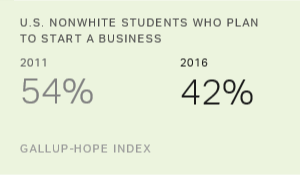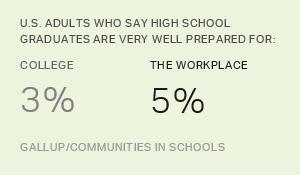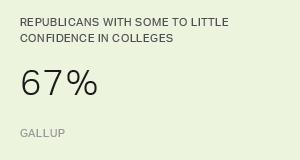Advanced Placement (AP) courses in high school have become a familiar part of the U.S. education landscape, with more than 1 million students taking AP exams across 38 different AP course offerings.
Taking AP exams enables high schoolers to gain credits they can apply toward a college degree -- potentially fast-tracking them to earning a postsecondary diploma and reducing tuition cost.
Students can take AP courses in a wide range of subjects including micro- and macroeconomics, statistics, physics, computer science, art history, Latin, and music theory.
But something is missing from this curriculum.
It's time to establish an AP equivalent for entrepreneurship to boost students' opportunities to become builders of companies, social enterprises, nonprofits, and new products and services.
Future economic growth and prosperity -- not to mention fulfilling lives for students -- demand such a program.
Who should lead the way in establishing an accelerated entrepreneurial program -- and why?
First and foremost, developing an AP equivalent on entrepreneurship should be a national priority and a nationwide initiative that has fundamental support from vital organizations and stakeholders -- including schools, colleges and universities, nonprofit organizations, employers, foundations, and philanthropists.
We have already seen an upsurge in various entrepreneurship programs and initiatives in higher education, including widespread course offerings, business plan competitions and even angel funding networks on college campuses across the country.
For students in middle school and high school, these efforts have expanded as well.
For example, long-standing organizations such as the Network for Teaching Entrepreneurship (NFTE) and Junior Achievement have been ramping up their efforts to encourage, teach and mentor young people to foster an entrepreneurial mindset.
More broadly, television shows like Shark Tank, a reality show that features entrepreneurs trying to convince self-made millionaires to invest in their ideas, have become popular, as have initiatives such as the "Rise of the Rest" campaign led by Steve Case.
All of these efforts -- taken together -- are inspiring a reawakening of the American entrepreneurial spirit.
And it, indeed, needs a reawakening.
║┌┴¤═° has reported on the decline in the number of new business startups in the U.S. To catalyze gaining momentum, we need to create some sort of "credential" or learning pathway so students can get started with entrepreneurship or building early.
We also need to increase both the volume and success of those who choose to build new companies, social initiatives, and innovative products or services for organizations they work for.
This is totally doable. And "do" is a critical part of the equation.
What should an accelerated program for entrepreneurship look like?
Compared with programs for classic academic subjects, a program for builders should look different.
Yes, it should include several aspects of business education. But students will also need support from mentoring relationships and hands-on experiences ranging from business plan competitions to interning or working in real startup organizations.
The program will also require -- as ║┌┴¤═° has discovered from years of intensive research -- students to understand their natural builder talents and how they can apply them to creating an enterprise.
║┌┴¤═° recently released a new book, , that delves into the research behind what it takes to become a successful entrepreneur and builder.
It includes groundbreaking insights into how individuals and teams can maximize the human potential aspect of the multifaceted equation behind entrepreneurial success.
The book includes access to an assessment -- similar to -- that students can take to identify their builder talents. They can then develop and apply those talents to building in their own lives, whether they actually start a business or organization or not.
After all, students will be able to apply the entrepreneurial spirit and the ability to create and build to all aspects of their work and life.
If we can develop a collective effort among high schools, colleges and various other ecosystem partners and create a defined pathway for students to get excited about to learn and experience entrepreneurship, we will be doing the country and everyone in it a great service.
Using the AP model as an example, such an initiative should include a defined curriculum, guided experiential opportunities, measurable outcomes and an explosion of talent identification for promising young entrepreneurs.
Just like the U.S. has built one of the world's most effective talent identification and development system for athletes, we can do the same for builders.
And there's no way to do that faster than to create a mechanism throughout our educational system.
Note: AP courses and exams are run by the College Board. Although the idea of an AP course for entrepreneurship would certainly be a powerful addition for them to consider, this appeal is geared more broadly to constituents and organizations that can help the U.S. create a more accelerated path for students to learn about and experience entrepreneurship.



